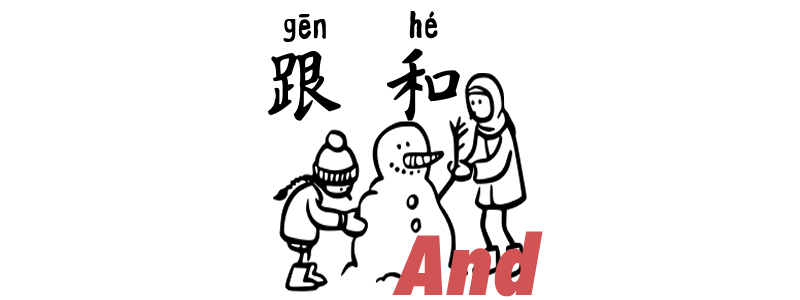Grammar Point:
和 hé and 跟 gēn are two conjunctions used to connect two nouns or noun phrases, indicating that they are both included in a list or group. It is similar to the English “and” and is often used to connect two people, two things, or two action activities.
Structure
Noun + 和/跟 + Noun
和 hé is generally considered more formal and literary than 跟 gēn. It is often used in written or formal contexts, such as news reports, official documents, and academic papers. 跟 gēn is more colloquial and informal, and is often used in everyday speech.
我和他是公司同事我和他是公司同事
He and I are colleagues in the company.
我喜歡兔子、小鳥、貓跟狗我喜欢兔子,小鸟,猫跟狗
I like rabbits, birds, cats, and dogs.
你跟你爸爸都會說英文嗎?你跟你爸爸都会说英文吗?
Do you and your dad both speak English?
爸爸和媽媽的生日都在三月爸爸和妈妈的生日都在三月
Both dad and mom have their birthdays in March.
你想跟朋友一起去中國嗎?你想跟朋友一起去中国吗?
Do you want to go to China with friends?
Noun Phrase + 和/跟 + Noun Phrase
我要買一杯咖啡和一塊蛋糕我要买一杯咖啡和一块蛋糕
I want to buy a cup of coffee and a piece of cake.
週末的時候他常常在家聽音樂跟看電視周末的时候他常常在家听音乐跟看电视
During the weekend, he often listens to music and watches TV at home.
他家有一隻狗跟一隻貓他家有一只狗跟一只猫
He has a dog and a cat at home.
我想喝這個跟那個我想喝这个跟那个
I want to drink this one and that one.
FYI
那个 nàge or nèige is a common Chinese phrase that can be translated to “that” or “um” in English. It’s often used as a filler word in conversation, similar to saying “um” or “uh” in English. However, some foreigners may associate it with the word “nig*er”, which can be shocking and offensive. But the fact is, most of Chinese people do not know this word.
Common Mistakes
我們去餐廳和吃飯我们去餐厅和吃饭 ❌
We go to the restaurant and eat.
(We don’t use ‘and’ in this context. Also, ‘go to a restaurant’ is not a noun phrase.)
我們去餐廳和咖啡店我们去餐厅和咖啡店 ✅
We go to restaurants and cafes.
我們去吃飯和喝咖啡我们去吃饭和喝咖啡 ✅
We go to eat and drink coffee.
(Both eating and drinking coffee are noun activities.)
我喜歡狗和我弟弟喜歡貓我喜欢狗和我弟弟喜欢猫 ❌
I like dogs and my younger brother likes cats.
(Again, ‘I like dog’ and ‘my younger brother likes cat’ are not noun phrases.)
我和我弟弟喜歡狗我和我弟弟喜欢狗 ✅
I and my younger brother like dogs.
我喜歡狗可是我弟弟喜歡貓我喜欢狗可是我弟弟喜欢猫 ✅
I like dogs, but my younger brother likes cats.
我想去旅行和你我想去旅行和你 ❌
I want to travel with you.
我想和你去旅行我想和你去旅行 ✅
I want to travel with you.


